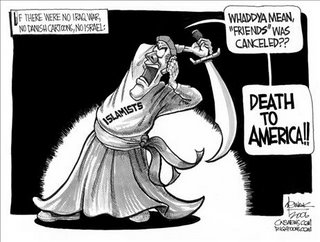Profiles in Terrorism

By Fouad Ajami
________________________________
Posted Sunday, October 1, 2006
Political terrorism is as old as human history-the very word assassins derives from the Arabic hashshashin (hashish takers), after a terrorist cult that was established in Iran in the 11th century. The followers of this cult are the forerunners of today's terrorists. As their story is told by the great historian Bernard Lewis in The Assassins (first published in 1967), these cultists operated from castles in remote mountain areas under a shadowy leader known as "the Old Man of the Mountain." Their victims were rulers of Islamic dynasties and some lords of the Crusader principalities in the land of Islam. The victims, we are told, were chosen with care, and the assassins were "suicidals" who never returned alive from their missions.
Today's terrorists, the heirs of those merciless men, operate in a world without limits. In one of the most revealing statements on the old terror, chroniclers of the Ottoman Empire tell us that the Ottoman sultan Abdul-Hamid II made a habit of carrying a small child on his knees during his weekly appearances in public. That ruler reasoned that no decent assassin would aim at him and risk the life of a child. In our world today, such scruples have been swept away. The field of battle now spans pizzerias, buses, public squares, commuter trains, and subway stations. The Old Man of the Mountain may have been exceptional in his cruelty. But the new princes of terror are cut from a wholly different cloth. They have obliterated the basic distinction between combatants and noncombatants that was part and parcel of the practice, and the theory, of war.
Sociologists and terrorism experts have endlessly profiled those who have joined the brigades of terror. But the boys of terror now confound their profilers. The standard interpretation that attributes terror to poverty and deprivation has been dealt a deathblow by the biographical data of the new perpetrators of ruin. A young man of the Egyptian middle class, Mohamed Atta, led the death pilots of 9/11. He had not come from abject poverty; he had made his way to graduate education in Germany. Ziad Samir Jarrah, a boy of Lebanon's well-off communities, and a party boy at that, was at the controls of United Airlines Flight 93, which crashed into the field in Pennsylvania.
The very "normalcy" of the new terrorists is perhaps their most disturbing characteristic. An official inquiry for the House of Commons into the transit and bus bombings that hit London in July 2005 concedes the difficulty of "profiling" and of detection. The investigations uncovered little that was unusual about the four men who pulled off the deed.
"The backgrounds of the four men appear largely unexceptional. Little distinguishes their formative experiences from those of many others of the same generation, ethnic origin, and social background ... ."
The ringleader, Mohammed Sidique Khan, born in West Yorkshire, was something of a role model for younger people. "He was highly regarded by teachers and parents and had a real empathy with difficult children. He was not aggressive, extreme, or politicized in the way he spoke about religion to colleagues. He had spoken out against the 9/11 attacks at school." One of the four perpetrators of this operation, Shehzad Tanweer, also of West Yorkshire, appears to have led "a balanced life," the report observes. "He owned a red Mercedes, which his father had bought for him. He took care with his appearance, with fashionable hairstyles and designer clothing."
There is a strand of liberal thinking that aims to explain the terror and succeeds only in explaining it away. Terror is justified if we drown it in the search for "root causes" or if we insist that the terror sprang from "legitimate" grievances. In this vein, nowadays it is maintained that Islamist terror was fed by the rage over the American invasion of Iraq. This argument is off the mark, the product of naivet or of a determined opposition to the war. We should know better.
The trail of radical terror, emanating from Islamic lands and Islamic movements, predates the Iraq war. We have three decades of this kind of terror behind us. Our consolation perhaps lies in the fate that awaited the original cult of assassins. In their time, they had fame, and their potential victims feared them. But the world of organized states in the end triumphed, and the fury of the zealots was no match for the determination of mainstream society to shake off the assassins and to defend the normal order of things.
http://www.usnews.com/usnews/news/articles/061001/9fouad.htm
Comments